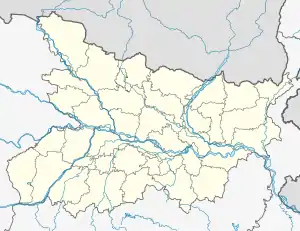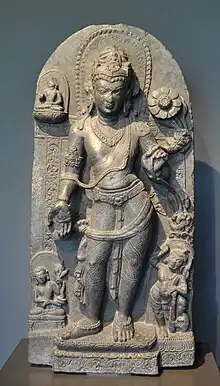Telhara, Nalanda district
Telhara is a village in Ekangarsarai block of Nalanda district, in Bihar. It is also the site of the Telhara monastery which dates back to the 1st-century CE.[1]
Telhara
Telhāḍa | |
|---|---|
village | |
 Telhara Location in Bihar, India | |
| Coordinates: 25.226334°N 85.181587°E | |
| Country | |
| State | Bihar |
| District | Nalanda |
| Gram Panchayat | Ekangarsarai |
| Languages | |
| • Spoken | Hindi, Magadhi |
| Time zone | UTC+5:30 (IST) |
| PIN | 801306 |
| Vehicle registration | BR-21 |
| Nearest cities | Jehanabad (22 km) Bihar Sharif (35 km) Patna (63 km) |
Buddhist monastery
Telhara was the site of a Buddhist monastery in ancient India. It has been mentioned as Teladhaka in the writings of the Chinese traveller Hiuen Tsang, who visited the place in the 7th century CE.[2] It is mentioned in an inscription found at Nālandā which mentions a temple restored a man named Bālāditya, a Jyāvisa of Telāḍhaka who had emigrated from Kauśāmbī, in the eleventh year of Mahipala Deva. [3]
It has been also mentioned in the Ain-i-Akbari as Tiladah, and is shown as one of the 46 mahals (administrative units) of the Bihar sarkar. Telhara was shown as a pargana in the maps prepared by the East India Company administration during 1842–45.[4]
The ruins of Telhara were mentioned in an 1872 letter by A. M. Broadley, the then Magistrate of Nalanda. Broadley noted that a large number of stone and metal images were often found during the digging of graves at the top of one of the mounds. Metal images found were melted down.[5] The State Government of Bihar started a new archaeological excavation of the site in December 2009. The work unearthed ancient pottery, antiques, and the remains of a three-storeyed structure mentioned by Hiuen Tsang. Evidence of prayer halls and residential cells in the monastery have been found. The excavation revealed the following chronological layers:[4]

- Northern Black Polished Ware (3rd Century BCE)
- Kushan (1st century CE)
- Gupta (5th to 7th century CE)
- Pala (7th century to 11th century CE)
A number of sculptures from the site had been moved to museums during the British Raj. The Indian Museum in Kolkata houses the Maitreya and the twelve-armed Avalokiteswar images from Telhara. A Pala sculpture from the site is present at the Rietberg Museum in Zurich. Telhara has a mosque, which is said to have been built with the materials carried from the ruins of the Buddhist monastery.[4] One pillar contained an inscription that mentions the place-name Telāḍhaka.
Remains of an ancient university (Mahavihara) on the site were unearthed in 2014.[6][7]
A small museum named Baladitya Museum has been established to store some of the artifacts found.
Administration
Telhara comes under the administration of the Ekangarsarai gram panchayat. There are 5 census villages in the Telhara area:[8]
- Hajipur
- Khajepura
- Rasulpur
- Telhara
- Telhara Sani
References
- Salila Kulshreshtha (5 October 2017). From Temple to Museum: Colonial Collections and Umā Maheśvara Icons in the Middle Ganga Valley. Taylor & Francis. p. 172. ISBN 978-1-351-35609-1.
- Leoshko, Janice (1988). "Buddhist Images from Telhara, a Site in Eastern India". South Asian Studies. 4: 90–97. doi:10.1080/02666030.1988.9628371.
- The Palas of Bengal, R. D. BANERJI, 1915
- Dr. Atul Kumar Verma. "Telhara (Nalanda) Excavation - A Brief Report (PDF)" (PDF). Retrieved 15 January 2014.
- Explored Sculptural Heritage of Telhara, District Nalanda, Bihar: A Recent Visit, Pampa Biswas, Puravritta Volume 1, 2016, p. 167–182
- "Another ancient university found in Nalanda | Patna News - Times of India". The Times of India.
- "Telhara university". Archived from the original on 22 April 2016.
- "Reports of National Panchayat Directory". Retrieved 15 January 2014.